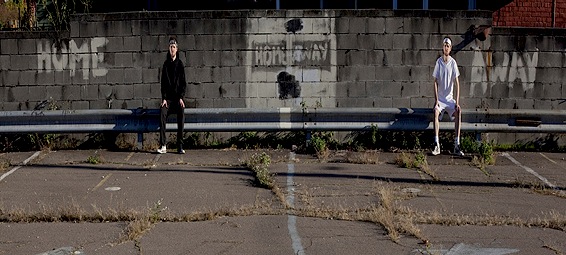Pittsburgh, PA’s Gregg Gillis is best known by his alter ego: Girl Talk. The project has certainly made its mark on popular culture in the past four years by elevating mashup-styled dance music to crossover status. In fact last night’s 7-11 sponsored Dallas show sold out in mere minutes. But one very interesting aspect of Girl Talk’s music is that much of its roots are planted in an avant-garde tradition that spans many decades and continents. Just as interestingly, Gillis’ origins and artistic evolution started in Pittsburgh’s rich DIY scene, where he was influenced by a sometimes controversial writer and show promoter named Manny Theiner and the various projects with which he was involved.
I had a chance to spend a few minutes with Gillis before his show last night to discuss the origins of Girl Talk and how it led to his current artistic achievements.
FrontRow: So when I heard that you’re originally from Pittsburgh, and I guess you still live there, I immediately thought of Manny Theiner and Garfield Artworks, and then I read an interview where you mentioned Manny going to see your old band The Joysticks. Did you ever actually play Garfield Artworks?
Girl Talk: Many times. And his venue prior to Garfield Artworks, the Millvale Industrial Theater. I met Manny at Lollapalooza 1995. He was passing out these pamphlets: “Lollapalooza 1995 Does Not Present Pittsburgh’s Guide To Underground Music.”
FR: Oh, wow…
GT: It was this pretentious hand-flier, but it was a life changing thing because it taught me about local college radio as well as venues. So with that pamphlet, I started looking into it and checking out the bands and trying to find out about things. That was me stepping into going to those sorts of shows. That was when I was about fifteen. I used to go to all of his shows all the time. His old Millvale Industrial Theater; I used to go there once or twice a week whenever it was going on, and my old band would play there. Then the early Girl Talk shows were there.
So it was always a Manny-related thing. He even put out two compilations of electronic music in Pittsburgh. He booked a tour for those, so I’ve actually traveled with Manny before. I can honestly talk for hours about the man, ya know? He’s just a myth and a legend. He’s had such a huge impact on my life, just as far as introducing me to all of this music. And booking my bands prior to Girl Talk, and then the Girl Talk stuff. Just being open-minded about all of that definitely steered things heavily.
Even now in Pittsburgh when I do larger shows, I try to keep him involved. And I still go to Garfield Artworks on a regular basis.
FR: What were those electronic compilations called?
GT: They were called Circuits of Steel I & II. So there was a tour for each of those. That was the first time I actually hit the road. That was the summer of 2002 and the summer of 2003. I mean, the most exciting thing about it was existing with Manny in a van. People only see him in that one space, especially in Pittsburgh. He just has this wall up around him. He’s a hard guy to get through on a personal level, but traveling with him just felt like an exciting breakthrough. It’s like a claim to fame, I feel like, in Pittsburgh: I traveled with Manny in a van for a week.
FR: He’s pretty controversial. I’ve always defended him and gotten a really hard time for it.
GT: (Laughter) He is hated by many people and, you know, it’s all good. I understand it. There are certain styles of people that kind of respect what he’s doing almost on a performance art level — the way he interacts with people. I feel like he does have some social issues, and it’s all good. I’m not talking s*** on the guy at all. But it’s like, you have to just love those. It’s kind of like meeting a cranky old man: you love that person because he’s mean. And that’s cool. I feel like some people are potentially so insecure and ready to react that they can’t take it, him being mean. I feel like once you get to know him long enough, you’re not going to react to him being a dick to you. It’s just like, “Oh, yeah, that’s Manny.”
It’s funny because city-to-city, even country-to-country, when I say I’m from Pittsburgh, there are a lot of Manny stories.
FR: He’s an icon.
GT: Yeah, even in Pittsburgh, it’s a topic that’s kind of beaten to death in a fun way. But it comes up, and it’s a topic you still want to talk about, you know what I mean? When it’s all of my friends, a very common topic is “Exploring Manny. The Essence Of Manny.”
FR: In listening to your earlier work with The Joysticks you can hear traces of what you would eventually do, with the skipping CD sounds. But in some ways it also sounded like stuff that people like Christian Marclay had done, with purposely skipping records. How much of that has influenced you, the intellectual or art museum side of things? Do Christian Marclay or Plunderphonics or Steinkski actually matter to you or were you impacted by something else altogether?
GT: Yeah, I mean, that was definitely a huge impact. I grew up liking Hip Hop and Rap Music, so naturally I enjoyed listening to sampling and I respected it. But when I started, when I was young, when I met Manny and I was diving into college radio, I got into a lot of experimental music. It started with straight-up Japanese Noise stuff like Merzbow and Masonna and stuff like that. And even American stuff like Cock ESP, I like the performance art stuff like that. But then I always loved Pop, so I loved people that were doing experimental music that had appropriations of Pop. Like Negativland, and of course John Oswald, and Marclay and all those people. So that kind of struck a chord with me and that’s where The Joysticks wanted to go.
We were young too, so that band was kind of like Cock ESP, that just destroys stuff. That’s what we did as well. We were like a brattier, young version of that. Where we would just be playing a Christina Aguilera CD completely distorted and smashing TV’s, and that would be the show. So all of that side of it, the more underground, experimental, college radio, and the academic side, were huge influences, especially on The Joysticks and even on the first Girl Talk record and those years. I’m still a fan of all of that stuff, I just think that the interest in the project — it wasn’t like you were into that so you can’t like The Spice Girls. I like it all. I think over the years, with the project, it was like, “Alright, I kind of started in this experimental world, and I would like it to evolve.”
A big thing back then was the live show. I always wanted to have a laptop experimental show that was fun, and I would always be screaming at people to loosen up or to have fun. And it got to the point where I was like, “Well, people aren’t dancing because I’m playing music without a beat.” It was a real obvious solution to start making stuff that was a bit more accessible and sampling fragments that were recognizable. It was just this slow evolution; it was a little experimental, and it slowly faded out of that. And now of course, with the music and the shows — very far removed from Christian Marclay or anything like that. But it’s absolutely at the roots of what I do.
FR: How much do you think has changed around you since your first big tour? What do you think has changed in the perception and attitude of the audience? Do you feel that it’s an improvement or a decline? Do you have any nostalgia for the earlier days at all?
GT: Yeah, definitely. But I’m happy with where it’s at. One big thing was, with The Joysticks at least, on a very blunt level, it was about pissing the audience off or challenging people. But with Girl Talk I was almost challenging them with how much of a populist perspective it was going to be and embracing Pop.
Image: Girl Talk’s Gregg Gillis in two roles he’s very used to. Courtesy of Pitch Perfect PR.




